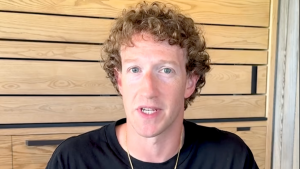Meta, the parent company of Facebook and Instagram, has made headlines with its decision to discontinue its widely criticized third-party fact-checking initiative, marking a pronounced shift toward what it describes as “restoring free expression” on its platforms. In a video announcement on Tuesday, CEO Mark Zuckerberg emphasized the intention to simplify policies and reconnect with user needs, aligning more closely with free speech advocates. This significant move comes in response to years of criticism surrounding perceived biases in content moderation, particularly concerning conservative viewpoints.
Meta Embraces Free Speech: A New Era of Self-Moderation Begins

Meta Embraces Free Speech: A New Era of Self-Moderation Begins
In a surprising shift, Meta has announced the end of its controversial fact-checking program to enhance user free expression.
The newly proposed “Community Notes” feature, inspired by a similar initiative on X (formerly Twitter), is poised to roll out in the United States. It aims to empower users to collaboratively provide context and insights on controversial posts, allowing for a more balanced exchange of ideas. Zuckerberg admitted the old fact-checking system, established in the wake of the 2016 election, had gone too far, acknowledging it was often influenced by political pressures.
During a special segment on "Fox & Friends," Joel Kaplan, Meta’s chief global affairs officer, reiterated the company's commitment to creating a more egalitarian online forum. This reflects a broader trend within the tech industry, as platforms like X have opted to prioritize decentralized content moderation models over centralized controls.
Responses to Meta's new direction have been mixed; conservatives and free speech proponents hailed this as a necessary redress against content bias, while critics voiced concerns about potential increases in misinformation. As seen with X’s success, however, a decentralized approach might promote more authentic discussions without excessive corporate oversight.
By prioritizing user agency over corporate moderation, Meta's latest strategy signals a monumental shift in managing online discourse. As these changes unfold, the social media giant will need to navigate scrutiny while striving for a more balanced digital conversation landscape.
During a special segment on "Fox & Friends," Joel Kaplan, Meta’s chief global affairs officer, reiterated the company's commitment to creating a more egalitarian online forum. This reflects a broader trend within the tech industry, as platforms like X have opted to prioritize decentralized content moderation models over centralized controls.
Responses to Meta's new direction have been mixed; conservatives and free speech proponents hailed this as a necessary redress against content bias, while critics voiced concerns about potential increases in misinformation. As seen with X’s success, however, a decentralized approach might promote more authentic discussions without excessive corporate oversight.
By prioritizing user agency over corporate moderation, Meta's latest strategy signals a monumental shift in managing online discourse. As these changes unfold, the social media giant will need to navigate scrutiny while striving for a more balanced digital conversation landscape.



















